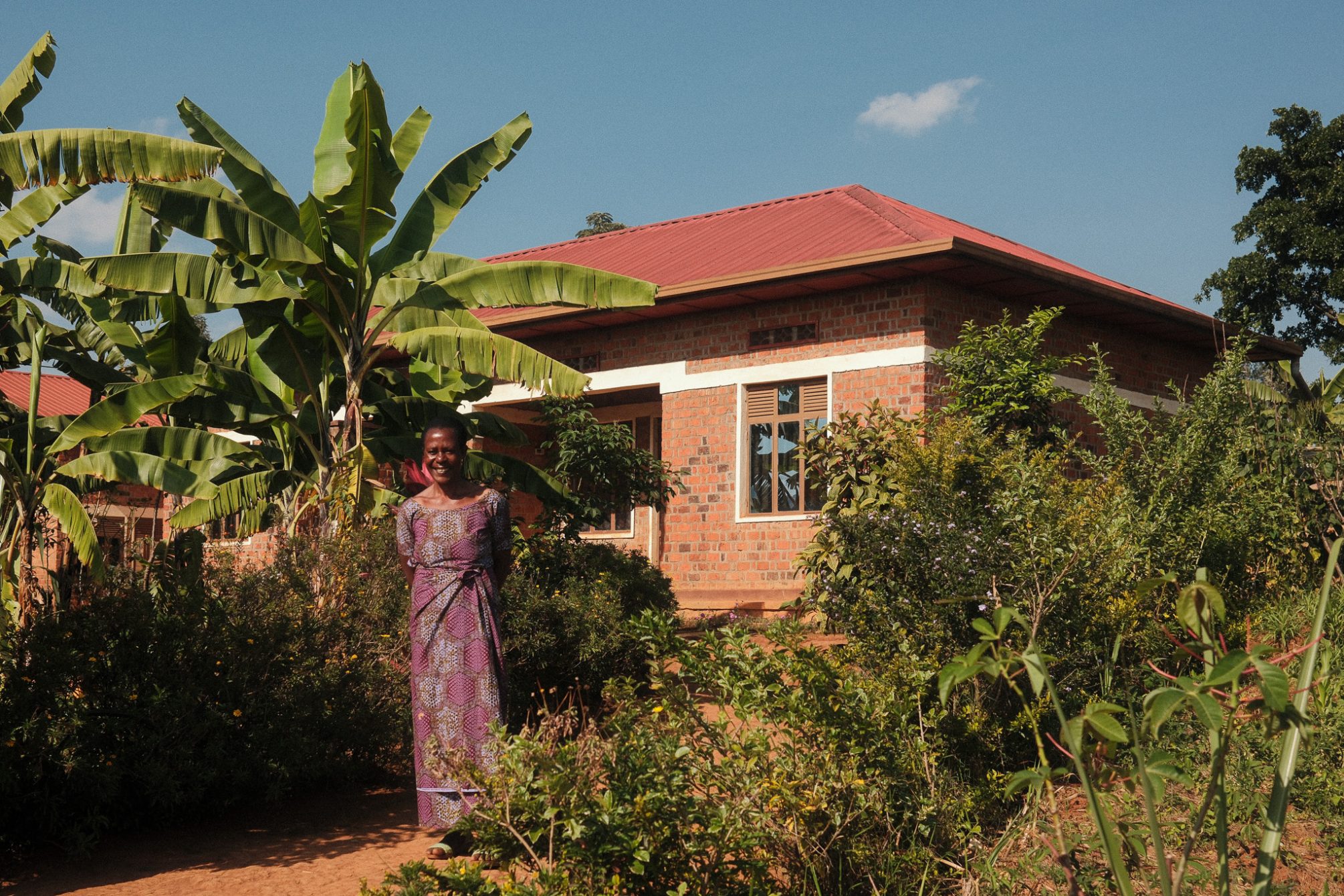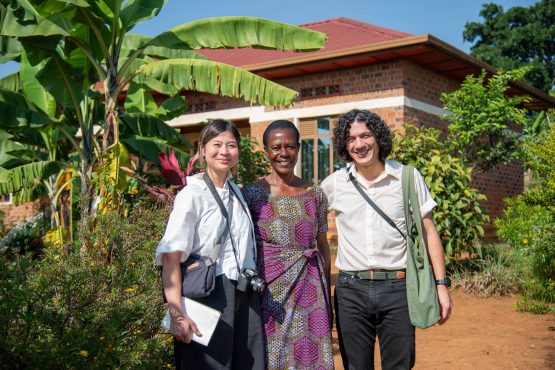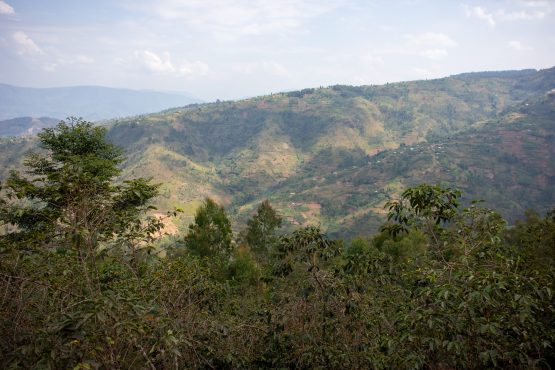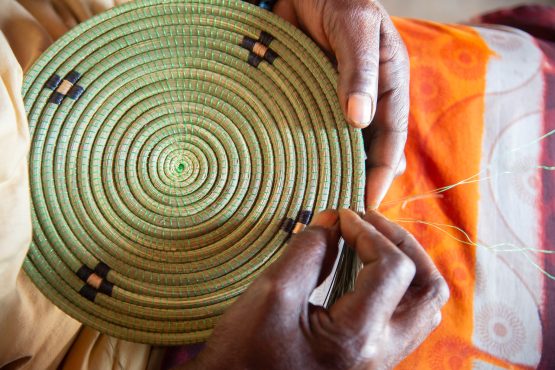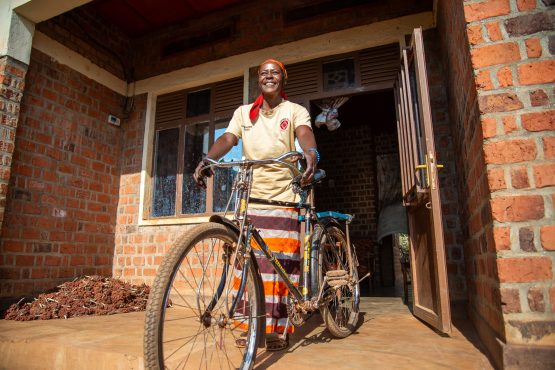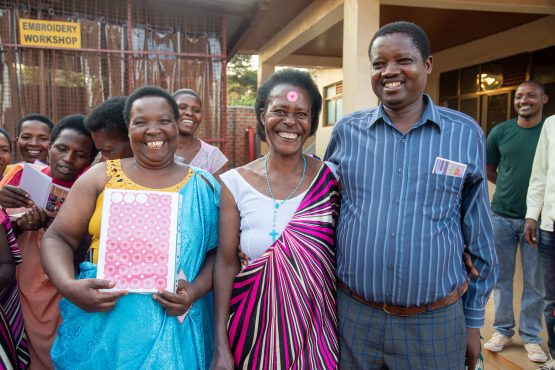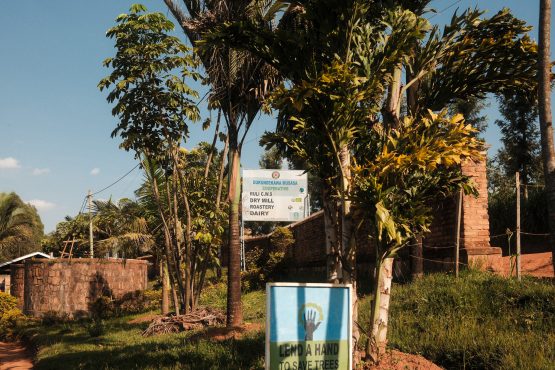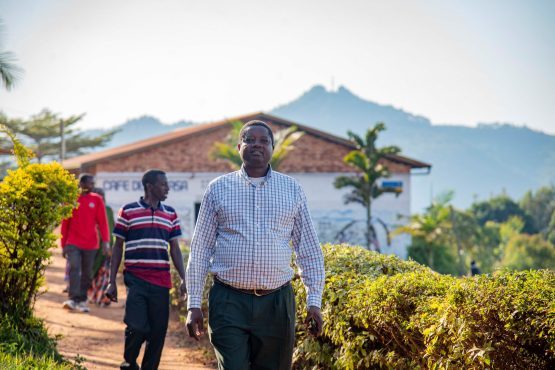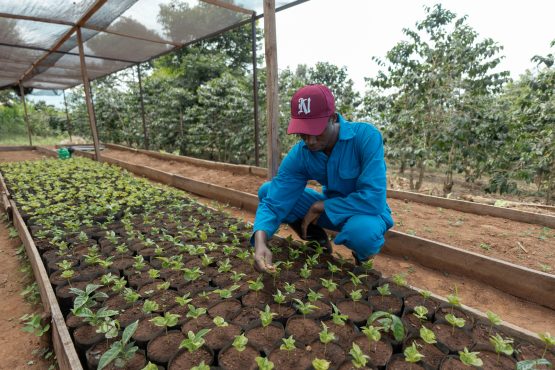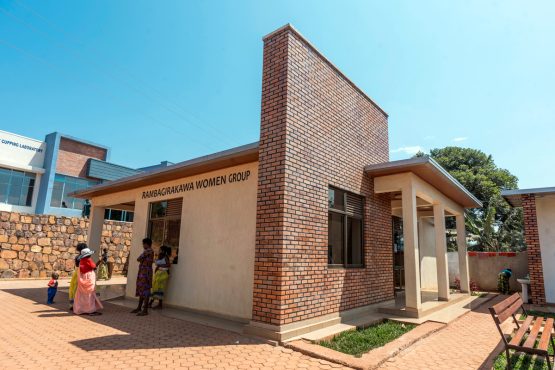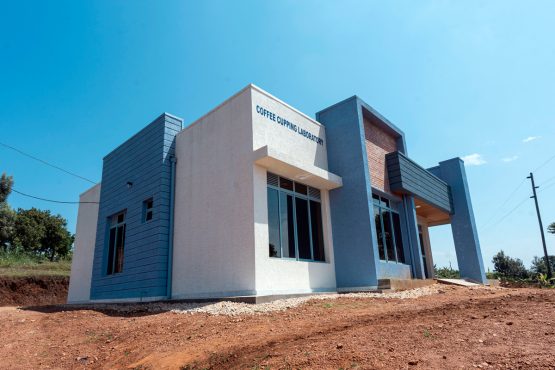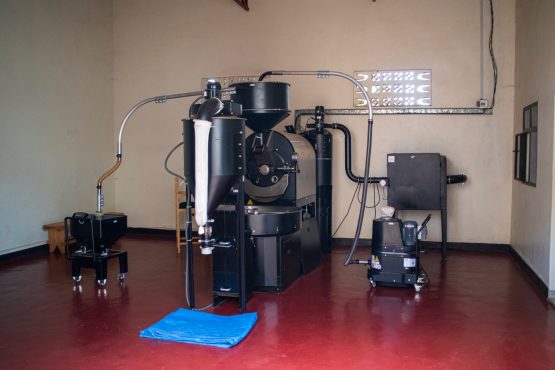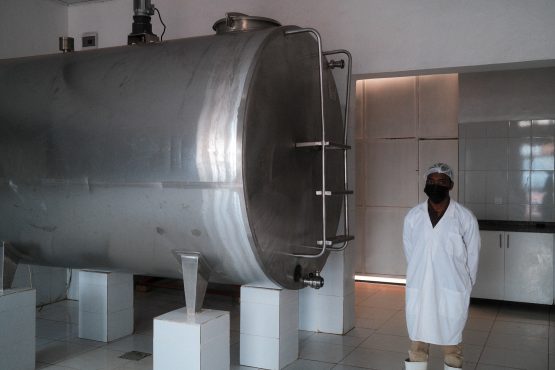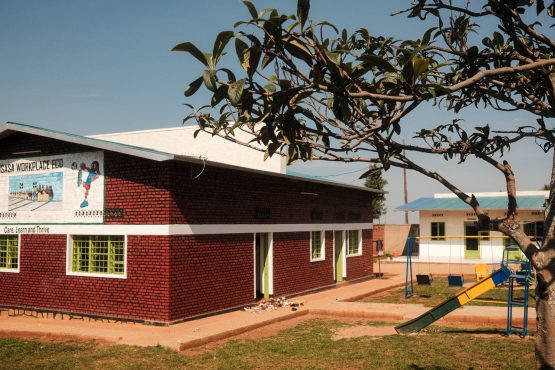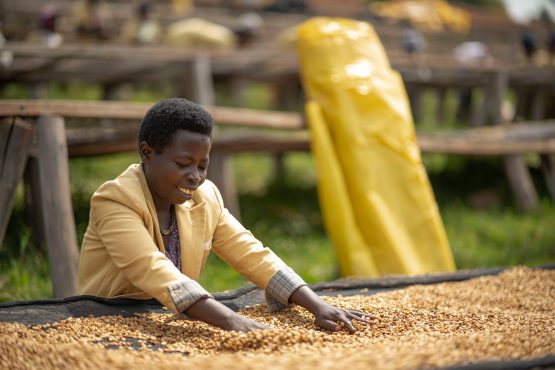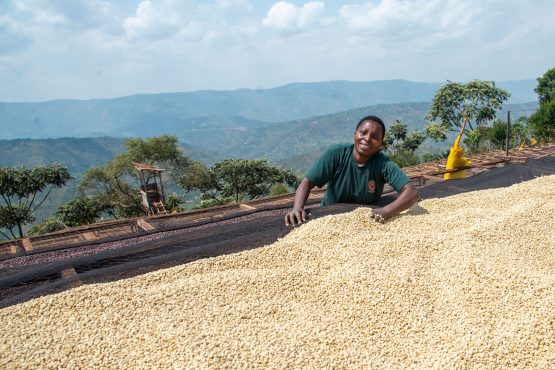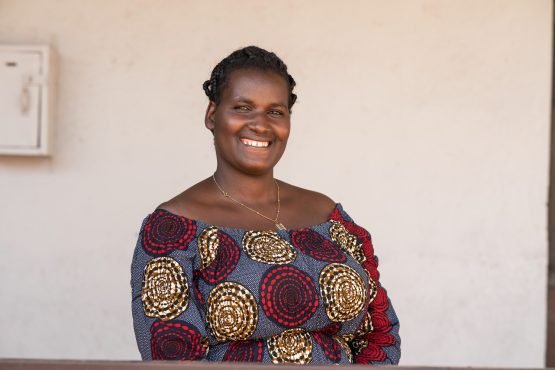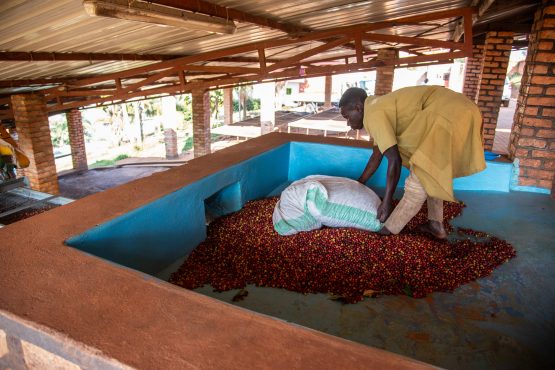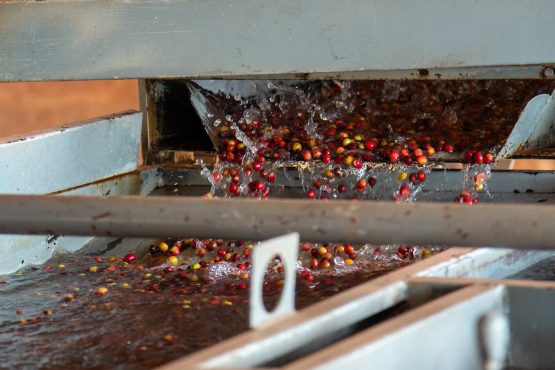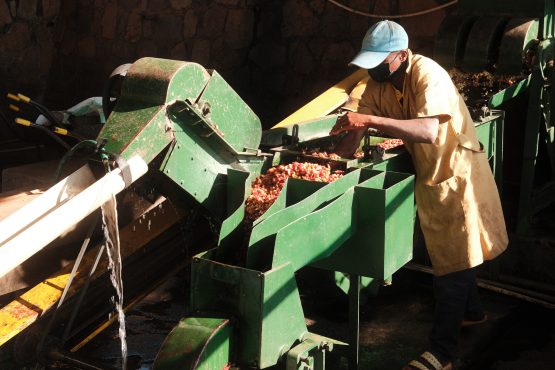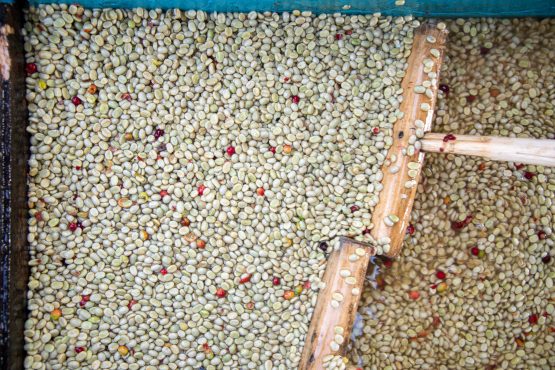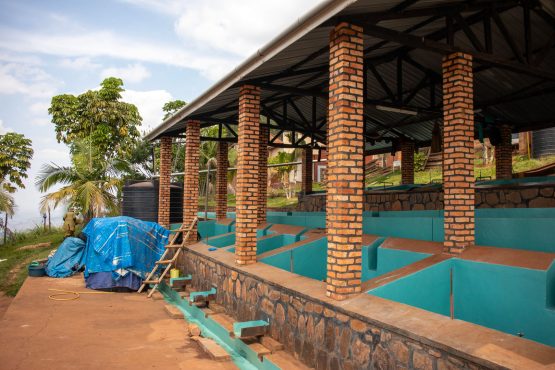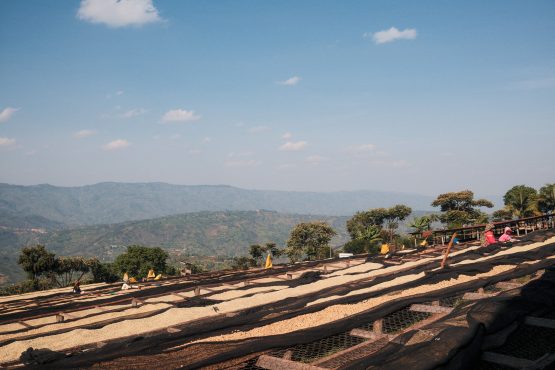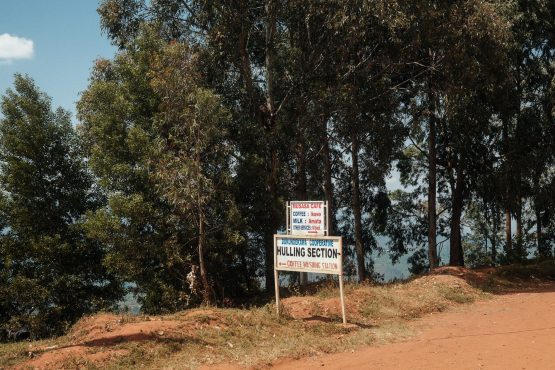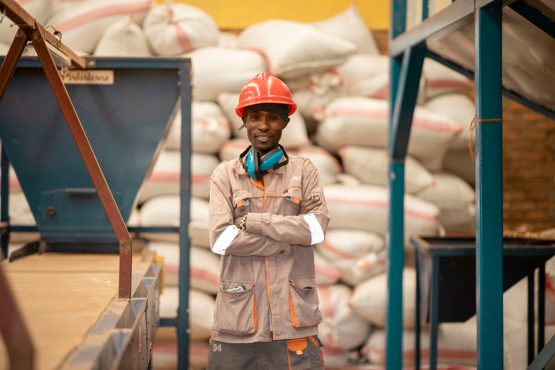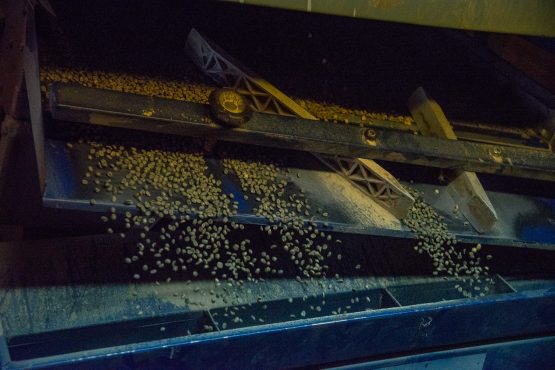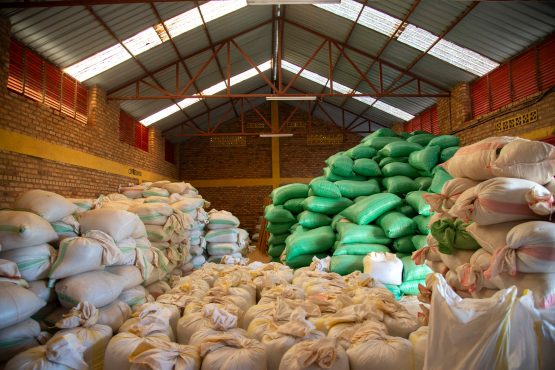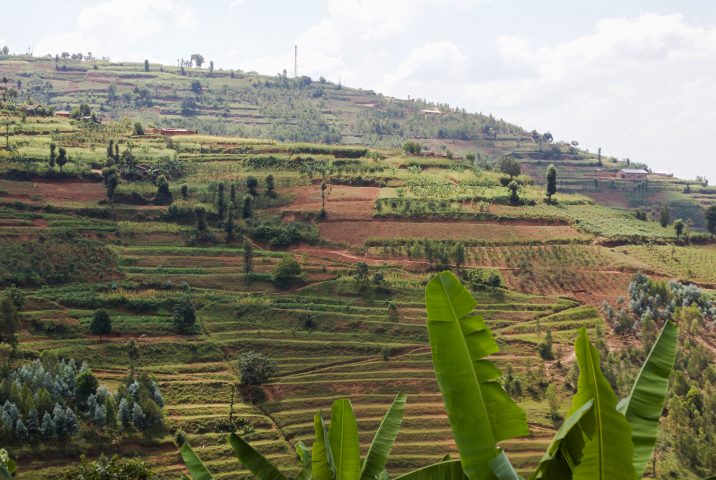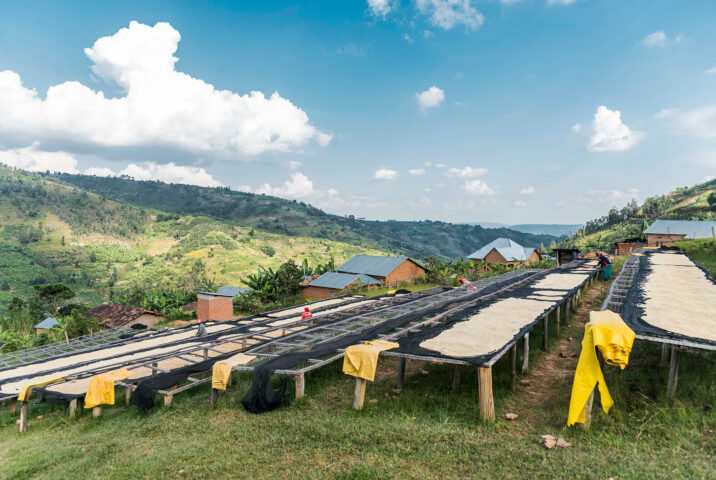Laurence Mukakabera
Raw honey with red apple and stonefruit, balanced by dark chocolate.
As a leader within Rambagirakawa, Dukunde Kawa Cooperative’s women’s alliance, Laurence Mukakabera is an incredibly busy woman. Whenever she’s not tending to her farm, she’s weaving baskets and handicrafts with fellow Rambagirakawa members, or helping care for her granddaughter. While Laurence’s production is small (she owns 550 trees), she grows and picks her coffee with meticulous attention to detail and care, resulting in exceptional quality that translates to an intensely sweet and juicy final cup. That’s why we are so excited to feature her coffee for another year, after first purchasing it in 2023.
Laurence was born into a coffee-growing family, and began to learn about farming from a very young age. Upon getting married, she established her farm with her husband, using seedlings they collected from already established coffee farms in the region. Sadly, Laurence became a widow during the horrific Rwandan genocide, forcing her and her two children to flee to Zaire (now the Democratic Republic of Congo) until the troubles in her country subsided. During these years, she supported herself and her family by weaving and selling baskets, as she had no access to any land for farming. When she returned to Rwanda, she found her property destroyed, and she faced the task of rebuilding her life from scratch while caring for her children.
Using her precious experience as a coffee grower, Laurence decided to re-start her plantation to generate her main income, and continued to weave baskets during the off-season. Through years of hard work, she was able to rebuild her home and educate her two children, eventually joining Dukunde Kawa Cooperative. In doing so, Laurence was able to connect and share her knowledge with other genocide survivor farmers in the area, becoming a leader within the co-op. When the Rambagirakawa women’s group was established, Laurence was one of the first to join — helping her reach a wider market with the baskets she continues to weave, and earning her a more stable and reliable income year-round. Today, Laurence owns 550 coffee trees and has gone to become a leader within Rambagirakawa. At her farm, she also keeps a cow she received from Dukunde Kawa and a pig she bought with the income generated through coffee. Along with coffee, Laurence grows sustenance crops like beans, cassava, potatoes and corn, which help keep her farm’s soil healthy and free of erosion.
When we first met and visited Laurence’s home, she spoke with a calm strength that commanded the entire room’s attention — including those of us who aren’t fluent in Kinyarwanda. When we asked her what being a part of Dukunde Kawa meant to her, she told us that “the cooperative has become a solace and bread provider to single mothers. We meet people, we learn and we grow together as a family.” This is true even in years when Laurence’s yields have dropped (as occurred in 2024 and 2025), as she explained that “after joining Rambagirakawa, I got new energy to do other things, I learned to make baskets and now the weaving gives me a good income and helps me to feed my family. Through the sales that we made with Rambagirakawa, I’m able to pay my health insurance, I’m paying the school fees for the grandchildren, and also supporting my family well.” During our visit, she was ecstatic when she received retail bags of her coffee from Australian and Thai customers, telling us “It’s a dream come true to sell coffee with my name! If people can appreciate the coffee that I produce it’s so emotional and I feel very proud and I take it as an accomplishment. It keeps me motivated to do it better and keep growing my coffee and making it so delicious and do it in a better condition.”
For Laurence, who looks after her granddaughter during the day, the completion of the Musasa Early Childhood Development Centre (which was largely funded by Australia and Thailand’s coffee communities) has been hugely beneficial. Not only is she involved as part of the centre’s leadership, but her daughter also works as one of the carers. When the ECDC first opened, the babies and toddlers who attended struggled to adjust to being separated from their mothers and grandmothers. Because Laurence lives a few hundred metres from the centre, she was able to volunteer her time during those early weeks, making the little ones comfortable as they adapted to the change. Mukakabera firmly believes the centre will have a lasting impact in the Ruli community, as she told us, “I believe the future is bright, and I hope the kids that will be raised there will be performing well in other educations. We are developing a brighter future generation through the ECDC. We are elevating the new cooperative leaders, or even the president of Rwanda!“
ABOUT RULI WASHING STATION
Ruli washing station was the first site established by Dukunde Kawa, back in 2003. It remains the main centre of operations for all of the cooperative’s activities, serving as the head office for the cooperative’s management team, who can often be seen buzzing about the property during the harvest.
In addition, the site is home to the Rambagirakawa Women Alliance’s community building and the newly-built Musasa Early Childhood Development Centre (Musasa ECDC), along with Dukunde Kawa’s cupping lab, nursery and model farm. Recently, the cooperative decided to expand their business by establishing a commercial roastery at Ruli, that supplies coffee to restaurants and hotels across town. Because the washing station is so central, Dukunde Kawa have also opened a café here, which sells the co-op’s coffee and locally baked goods. Recognising it has potential to service many members of the community, the cooperative is also hoping to establish their own bakery, to be run by youth who are part of the co-op.
Ruli is also where Dukunde Kawa’s dairy is located. Over the years, Dukunde Kawa have provided many of their member farmers access to their own cows, which are an important asset to a farming family. Culturally, they are seen as a symbol of wealth and status in Rwanda; practically, they provide milk and yoghurt to feed the family, produce excellent manure for the coffee farms, and create an opportunity for additional income. Having recently upgraded their largest pasteuriser from a 500L machine to one that can process 5,000L, Dukunde Kawa have been able to expand their operations at the dairy factory and take on a contract with a distributor who works throughout all of Rwanda and its neighbouring countries.
Over 2,000 farmers deliver cherry to the washing station throughout the season. Quality control at Ruli is overseen by Emerthe Mukamurigo, who has held this position since 2014, while day to day operations are managed by Philomene Nyirabantu, who has been a co-op member and part of Ruli’s full-time staff since 2004. In the twenty years she has been employed by the cooperative, Philomene has worked both as a drying officer at Ruli and as a field officer (she completed her studies as an agronomist in 2011), supporting member farmers in improving the quality and volume of their crop. Since 2022, Philomene has managed production at Ruli, earning the title of Station Manager in 2025.
During the harvest, Philomene is assisted by Dative Niyifasha, who supervises sorting and drying. There are a whopping 250 drying beds at Ruli, which require constant oversight. Dative has also been a cooperative and staff member since 2004, having transitioned from working with farmers on the field in 2017 to become a drying officer at Ruli. Both Philomene and Dative deliver coffee to be processed at Ruli and are members of the Rambagirakawa Women’s Alliance (Dative’s youngest is also a student at Musasa ECDC). The pair manage Ruli’s team with positivity and confidence — the pace at a processing site of this size can be relentless during the peak of the harvest — relying on their two decades of experience with Dukunde Kawa to continually encourage the washing station’s staff.
Ruli is Rainforest Alliance certified, UTZ certified, and Fair Trade certified. These certifications help the growing cooperative find different markets for the coffee. “We were already doing a lot of the things that were required for these certifications”, Isaac (the executive secretary of the cooperative at the time) explained, “We are always trying to be the best cooperative we can be. Getting the certifications has helped highlight what we are doing well and helped us raise our standards in other areas.”
Head here to learn more about the work of Dukunde Kawa in Rwanda.
PROCESSING AT RULI WASHING STATION
The team at Dukunde Kawa takes a huge amount of care in processing its coffee. All members of the cooperative are trained to only select ripe coffee cherries from their trees.
- On delivery, the cherries are inspected and sorted by hand to ensure only the very ripest cherries are processed. Farmers do the selecting, and receive the highest income from the ripest, healthier fruit. The remainder of their crop still gets purchased by the co-op, at a lower price, to be processed and sold for the internal market.
- Cherry is then sorted by weight using a Pinhalense machine, with any floaters are removed. By using a machine, rather than a clerk, Dukunde Kawa are more transparent with contributing growers about which fruit gets processed. Coffee is then depulped using a mechanical pulper that divides the beans into three grades by weight, with the heaviest, A1, usually having the highest cup quality.
- After pulping, the coffee is pre-washed, graded again using floatation channels that sort the coffee by weight, and left to ferment overnight for around 12–18 hours. The following day, wet parchment is the washed a second time and left to ferment for a further six hours — with the goal of removing as much mucilage as possible without using machinery that may accidentally crush or damage the beans.
- As with most washing stations in Rwanda, women do the majority of hand-sorting. This takes place in two stages – on the covered pre-drying tables and on the drying tables. Washed beans are moved from the wet fermentation tanks onto the pre-drying tables, where they are intensively ‘wet sorted’ under shade for four hours. The idea is that greens (unripe beans) are still visible when the beans are damp, while the roofs over the tables protect the beans from the direct sunlight.
- Next, the beans are moved onto the washing station’s extensive raised drying tables for around two weeks, where they are sorted again for defects, turned regularly and protected from rain and the midday sun by covers, ensuring both even drying and the removal of any damaged or defective beans. During this period the coffee is also turned several times a day by hand to ensure the coffee dries evenly and consistently.
- After reaching 11-12% humidity, the coffee is then transported to Dukunde Kawa’s purpose-built warehouse prior to final dry milling and hand sorting at the cooperative’s milling facilities.
- Located in Ruli, Dukunde Kawa’s dry mill has the capacity to process one full container of coffee a day — and combines the use of technology with meticulous hand sorting to ensure only the best beans are bagged. Before being loaded for export, Rwanda’s National Agricultural Export Development Board also inspects and samples the prepped parchment.
WHY WE LOVE IT
It is very rare to be able to get a coffee that is traceable back to a single producer in Rwanda, so we feel extremely fortunate to be able to share this special lot from Laurence Mukakabera’s farm Kinyonzo-Gihura. Most of the coffees we source from Rwanda are traceable back to a washing station, or sometimes a farmer group. Most washing stations in Rwanda receive cherry from hundreds (and sometimes thousands) of farmers who own very small plots of land – on average less than a quarter hectare, with just 300-600 coffee trees. Separation of such tiny lots is expensive and impractical, so the large majority of coffees are processed as a mixed lot from multiple producers. Typically, lots are separated as day lots (ie. cherries that were all picked on the same day) rather than by a single farm or producer group.
Laurence benefits from being a member of the Dukunde Kawa Cooperative, who have recognised the excellent agronomical practices she follows and consider her a role model to neighbouring farmers. Because the co-op also operate their own dry mill, they can process smaller lots individually, whilst minimising cost and maintaining excellent quality standards. Like many of the coffees Dukunde Kawa Cooperative produces, Laurence’s lot is intensely sweet and balanced, with this year’s crop presenting a creamy body with raw honey sweetness and notes of red apple and stone fruit.
